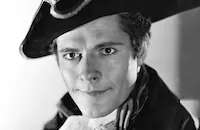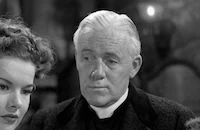Forgotten Girls
Cast & Crew
Phil Rosen
Louise Platt
Donald Woods
Wynne Gibson
Robert Armstrong
Eduardo Ciannelli
Film Details
Technical Specs

Synopsis
Innocent Judy Wingate works hard in a factory to support her dissolute stepmother Frances, who is engaged to gangster Eddie Nolan. One evening after Judy returns from work, Frances and Eddie leave for a night on the town with their friend, Grover Mullins, the right-hand man of gang boss Gorno. At midnight, Eddie returns to the apartment a few minutes before the others. He makes violent advances toward Judy, who panics and hits him over the head with a frying pan. Frances enters as Judy is leaving in hysterics and, filled with rage over Eddie's attempted infidelity, Frances kills him by hitting him again with the pan. Judy is arrested for Eddie's murder, and newspaper editor Linton assigns investigative reporter Dan Donahue to cover her trial. Dan and Judy are quickly smitten with each other when he interviews her, and Dan suspects that Frances knows more about the case than she is revealing. His suspicion is confirmed when he visits her apartment and she contradicts the story she told the police. Dan still lacks hard evidence, however, and Judy is convicted and sentenced to five years in a women's prison. Dan promises to wait for her and care for her beloved dog "Nipper." While upset about being incarcerated, Judy is nonetheless pleased by the prison's pleasant living conditions and tells her cellmate, Eve Abbott, that prison is preferable to life with her stepmother. Meanwhile, Frances is consumed with remorse and worries that Judy will implicate her, so she pleads with Mullins and Gorno to get Judy out of prison. In exchange for Judy's $10,000 life insurance policy, Gorno and his gang sneak Judy out of prison and dynamite a corpse they have left in her bed, thereby making identification of it impossible. Judy, assumed to be dead by the authorities, is then taken to Frances' new apartment. Judy is greatly distressed by her new predicament and escapes to Dan's place, from which she calls Frances to warn her that she is going to the police. Gorno is furious at Frances for putting him in such a dangerous position and orders Mullins to dispose of her while he pursues Judy. He finds her and Dan at the police station as she is about to turn herself in and threatens them to keep quiet. Just then, news arrives that Frances, who threw herself out of Mullins' speeding car, is in the hospital and wishes to make a deathbed confession. Judy and Dan rush to the hospital, where Frances confesses that she delivered the fatal blow to Eddie and helped engineer Judy's prison escape. Gorno shoots Frances as she is about to reveal his name, but he is in turn shot by the police. After Mullins is apprehended, Judy is cleared of all charges, and she and Dan are free to marry.

Director
Phil Rosen
Cast
Louise Platt

Donald Woods

Wynne Gibson

Robert Armstrong

Eduardo Ciannelli

Jack Larue

Barbara Pepper

Charles D. Brown
Sarah Padden
Ann Baldwin
Crew
George Beck
George Blair
Cy Feuer
F. Hugh Herbert
John Victor Mackay
Joseph Moncure March
Frank Mcdonald
Ernest Miller
Ernest Nims
Robert North
Adele Palmer
Murray Seldeen
Al Wilson

Film Details
Technical Specs

Articles
Louise Platt, 1915-2003
She was born on August 3, 1915 in Stanford, Connecticut. Her father was a Navy doctor who relocated to Annapolis, Maryland when she was a toddler. An early interest in school dramatics eventually led her to theater as a profession, and she made her Broadway debut in 1936 in a Philip Barry play, Spring Dance.
Platt made the move to Hollywood two years later, and although her film career was short (1938-1942), her keen intelligence in a variety of parts left a very pleasant impression on the silver screen. She was an effective romantic lead opposite Henry Fonda in Henry Hathaway's Spawn of the North (1938); held her own in a star-studded cast that included John Wayne, Thomas Mitchell and Claire Trevor, in John Ford's brilliant Stagecoach (1939); displayed a deft comic touch alongside Melvyn Douglas in Leslie Fenton's minor mystery gem Tell No Tales (1939); led a battleship into war (really) in Richard Wallace's cultish adventure yarn Captain Caution (1940); and showed some striking allure as a femme fatale in Jack Hively's noirish thriller Street of Chance (1942).
Despite her uniformly excellent performances in these films, Platt returned to Broadway, where her star shone brightly in the '40s when she landed the leads in such plays as Johnny Belinda and Anne of a Thousand Days. Platt would make some guest appearances on a few television shows in the '50s, including Alfred Hitchcock Presents, The Naked City, and a regular role in the popular soap opera The Guiding Light, before returning to the stage for the remainder of her career. She is survived by two daughters and several grandchildren.
by Michael T. Toole

Louise Platt, 1915-2003
Quotes
Trivia
Notes
A Hollywood Reporter news item states that the film is based on an "original" by Martin Mooney and Alex Gottlieb; however, no other confirmation of their participation in the film has been found. The Variety review observed that the picture "makes feminine prison life an attractive thing, decorating cells in frilly fashion and giving the whole the aura of a college dormitory."














